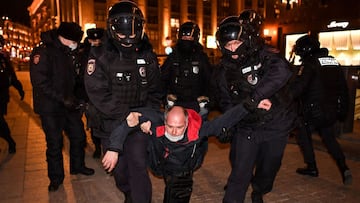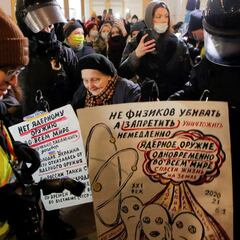How many protesters have been arrested in Russia? How are people avoiding arrest?
Anti-war demonstrations have been seen in Russian cities since the invasion of Ukraine began last month but tough new punishments may be curbing the protests.


The Russian invasion of Ukraine has been met with global outrage and has sparked anti-war protests around the world. Dissenting voices are normally kept pretty quiet in President Putin’s Russia but numerous large-scale protests have emerged in the last two weeks in opposition to the war in Ukraine.
OVD-Info, an independent human rights media project, estimate that around 13,000 protestors have been arrested for participating in demonstrations across more than 140 Russian cities since the invasion began on 24 February.
There have been numerous reports of excessive force being used against protestors and the use of stun guns and truncheons to disperse those gathered. As is common in Russia, there have been heavy fines and serious charges for those involved in the protests.
Today, anti-war protests are being held throughout Russia. Keep in mind every single protester you see risks a 15-year sentence for speaking out today. A snapshot:
— Eva Hartog (@EvaHartog) March 6, 2022
MOSCOW:https://t.co/amuXOjil2q
Russia cracks down on anti-war demonstrations
Under Putin the Russia state has wielded a huge amount of control to supress the activities of protesters and that effort has been intensified in the past year. In early 2021 there was significant public support for Alexey Navalny, the politician and most vocal opponent of Putin in Russian society.
In the aftermath of those protests Navalny’s organisations were designated as extremist groups and removed from the formal political landscape. Navalny himself was imprisoned, where he remains today, and new rules governing social media expression were introduced.
Even in the past week the Kremlin has approved new laws which punish civilians who spread ‘fake news’, meaning anything that contradicts the official account of events. On 4 March the Duma adopted legislation outlawing the distribution of "false information about the activities of the armed forces of the Russian Federation."
Russian Duma passes a law criminalizing distribution of “fake news” about the Russian military with up to 15 years in prison.
— Dmitri Alperovitch (@DAlperovitch) March 4, 2022
Calling for people to attend anti-war protests in Russia will now carry a penalty of up to 5 years in prison.
Repression in Russia accelerating rapidly…
Anyone found guilty of doing so faced a jail sentence of up to 15 years and a fine worth up to €10,000. Statista found that in 2021 the average annual salary in Russia was around $9,200.
These harsh punishments for those involved do appear to be having the desired effect and preventing people from attending the public gatherings. Anastasia, a Moscow-based civil rights activist, spoke to DW about the declining numbers at protests and the impact that the tough laws are having on the cause.
Related stories
"It was a catastrophe," she said of the latest demonstration at Pushkin Square. "I have never seen such a feeble protest in Moscow."
"Moscow controls a powerful security apparatus, and Russians are scared to lose their jobs now that sanctions have been imposed," she added. “There are few like me.”

